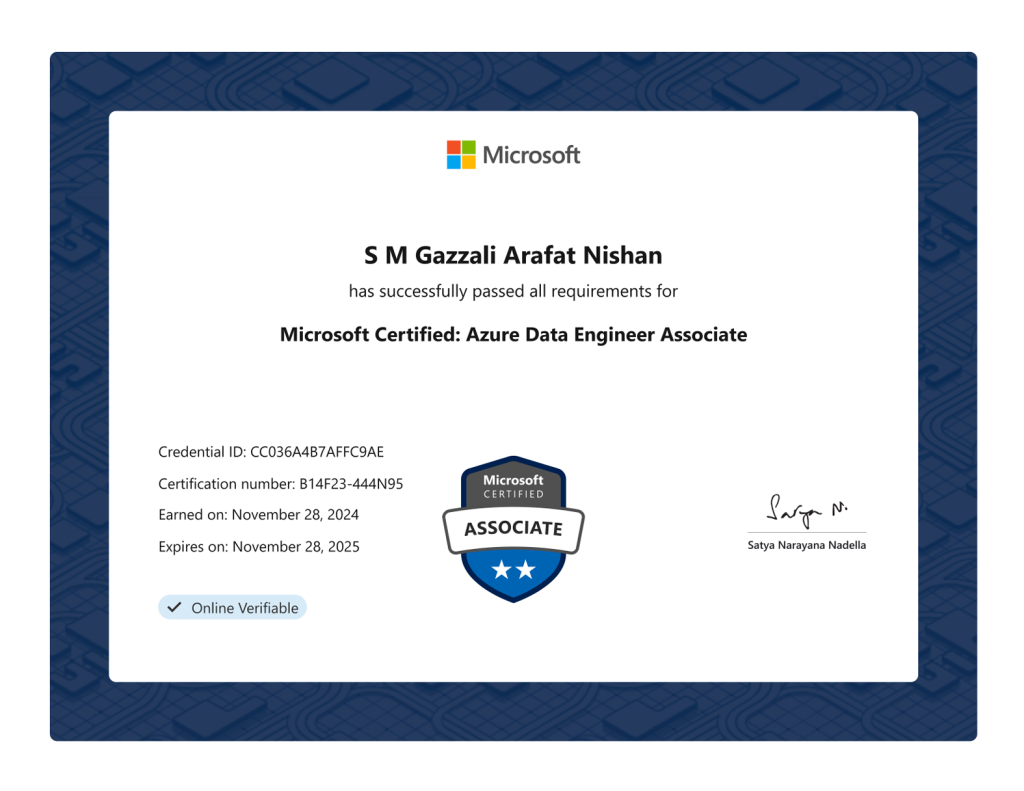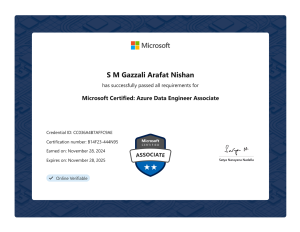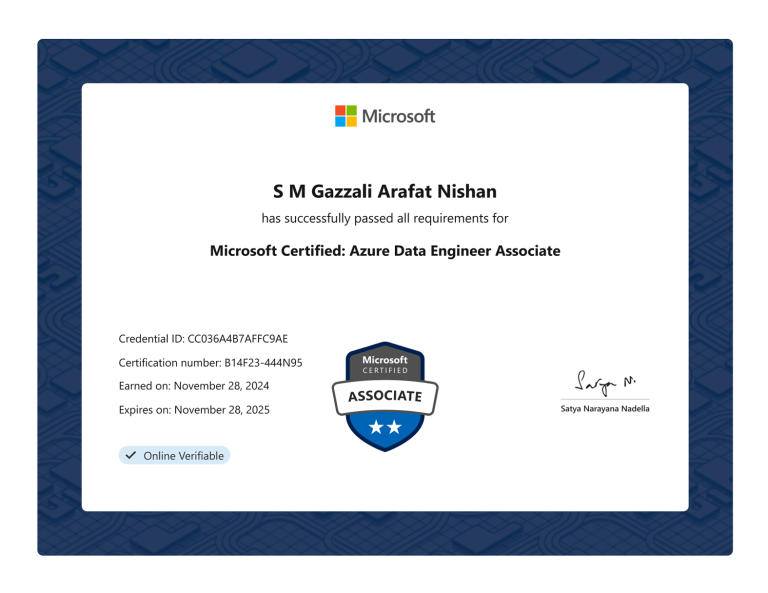Microsoft Azure certifications are more than just credentials; they are proof that you possess the skills needed to thrive in the ever-growing cloud computing space. Businesses today heavily rely on cloud platforms like Azure for their operations. Whether it’s hosting a website, managing databases, or deploying AI-powered tools, Azure is at the core of it all.
One of the reasons Azure certifications carry such weight is the increasing adoption of Microsoft’s cloud services globally. Over 95% of Fortune 500 companies use Azure, which means your skills can apply to organizations of all sizes, across industries. This isn’t just about working for tech companies. Retail giants, healthcare institutions, financial organizations, and even government agencies need professionals who can handle Azure’s robust capabilities.
But getting Azure-certified isn’t just about landing a job. It’s also about gaining a deeper understanding of how modern businesses operate. Cloud computing is no longer an optional tool; it’s a necessity. Earning an Azure certification positions you as someone who can make a meaningful impact in this landscape.
How Azure Certifications Lead to Career Growth
Let’s face it: competition for tech roles is intense. A resume filled with vague technical experience doesn’t stand out anymore. What sets you apart? Verified skills. Microsoft AZ-900 certification does exactly that. They’re like a seal of approval from Microsoft, telling employers you’re ready to tackle real-world cloud challenges.
What Employers See When They Spot an Azure Certification
For employers, hiring someone with an Azure certification means they don’t have to gamble on whether you know your stuff. You’ve already proven your expertise by passing a rigorous exam. This assurance is valuable in industries where mistakes can cost millions, like finance or healthcare.
Opportunities Beyond Cloud-Specific Roles
While Azure certifications naturally align with cloud-centric roles, they can also open doors to adjacent career paths. For instance, a developer with Azure certification can easily transition into a DevOps role. Similarly, a project manager with Azure knowledge is better equipped to handle cloud migration projects.
Industries Actively Seeking Azure-Certified Talent
Here’s the kicker: almost every industry needs cloud professionals. But some industries are particularly hungry for Azure-certified experts, including:
- Finance: For secure transaction systems and real-time analytics.
- Healthcare: To manage patient records and power telehealth services.
- Retail: For inventory management and personalized customer experiences.
- Government: For secure data handling and large-scale public service platforms.
Core Job Roles That Align with Azure Certifications
Azure certifications are tailored to match the real-world demands of specific job roles. Here’s a closer look at the most common roles and what they entail:
Cloud Solutions Architect
As a Cloud Solutions Architect, you’re the mastermind behind designing efficient cloud systems. Your role involves understanding a company’s unique needs and creating solutions that solve their problems. This job requires a mix of technical expertise and business acumen.
Example in Action:
A retail company wants to move its on-premises servers to the cloud while ensuring minimal downtime during the transition. You, as the architect, plan the migration, recommend Azure services (like Azure SQL Database), and ensure everything runs smoothly.
DevOps Engineer
This role is all about bridging the gap between development and operations teams. You’ll work on automating tasks, streamlining workflows, and ensuring software gets deployed quickly and reliably. Azure’s DevOps tools make this easier, allowing you to focus on high-value tasks.
Real-World Scenario:
A software company needs to roll out updates to its app weekly. As a DevOps Engineer, you set up CI/CD pipelines using Azure DevOps, ensuring that developers can push updates without causing disruptions to the live app.
Azure Security Engineer
In a world where data breaches make headlines daily, security engineers are in high demand. This role focuses on protecting cloud systems from threats, configuring secure environments, and monitoring for suspicious activity.
Why It Matters:
A single vulnerability can cost a company millions. As a Security Engineer, you’re the gatekeeper, ensuring that sensitive data and systems remain safe.
Data Engineer
Data Engineers are the backbone of any data-driven organization. With Azure’s data tools, you’ll design systems to collect, process, and store data, making it accessible to analysts and decision-makers.
Key Example:
A media company wants to analyze user behavior on its platform. You set up a pipeline using Azure Data Factory to collect data from various sources, transform it, and store it in a format suitable for analysis.
AI Engineer
AI Engineers are responsible for building intelligent systems that can mimic human behavior or make predictions based on data. Azure’s AI and machine learning tools, such as Azure Cognitive Services, make this job both exciting and impactful.
Fun Use Case:
Imagine creating a chatbot for a healthcare provider that can answer patient queries 24/7. Using Azure AI, you train the bot to understand common questions and respond accurately.
Beyond the Basics: Unique Azure Career Paths
While the roles above are well-known, there are other less-talked-about paths that Azure certifications can unlock.
IoT Solutions Architect
With IoT devices becoming part of everyday life, businesses need professionals who can design systems to manage and analyze IoT data. Azure IoT Hub, combined with tools like Azure Digital Twins, is perfect for this.
Cloud Game Developer
Cloud gaming is the future, and Azure PlayFab is at the forefront. Developers use it to create scalable, multiplayer gaming experiences. If you’re a gamer with tech skills, this might be your dream role.
Product Manager with Azure Expertise
Product managers often oversee cloud-related projects. Having Azure certification means you can bridge the gap between technical teams and business stakeholders, making you an invaluable asset.
Salary Insights and Job Market Trends
When it comes to earning potential, Azure-certified professionals are among the highest-paid in the tech industry. But salaries aren’t just about numbers; they reflect the value these professionals bring.
Entry-Level Salaries
Even with just an Azure Fundamentals certification, you can expect to earn between $70,000 and $90,000 annually in the U.S. That’s significantly higher than the average entry-level IT salary.
Mid-Level and Senior Roles
Mid-level professionals with certifications like Azure Administrator or Azure Developer typically earn $110,000 to $140,000 annually. For senior roles like Cloud Architect, salaries can exceed $150,000 annually.
Global Demand
Countries like the U.S., Canada, and Australia offer top pay. However, remote work trends mean you can access global opportunities without relocating.
Continuous Learning: The Key to Staying Ahead
Azure certifications are a great starting point, but they’re not the finish line. The tech world evolves fast, and staying relevant means constantly updating your skills.
Advanced Certifications to Consider
- Azure Solutions Architect Expert
- Azure DevOps Engineer Expert
- Azure AI Engineer Associate
These advanced certs help you specialize and stand out in competitive job markets.
Learning Beyond Certifications
Practical experience is just as important as certifications. Consider contributing to open-source projects, participating in hackathons, or building your own projects using Azure tools.
FAQs for Aspiring Azure Pros
1. What’s the Best Azure Certification for Beginners?
Start with Azure Fundamentals (AZ-900). It’s beginner-friendly and covers the basics of cloud concepts and Azure services.
2. Do Azure Certifications Expire?
Yes. Most certifications need to be renewed every year to ensure you’re up to date with the latest technologies.
3. Is a College Degree Necessary?
Nope! Many companies prioritize certifications and practical skills over formal education.
4. How Do I Prepare for Azure Exams?
Use resources like Microsoft Learn, practice tests, and hands-on labs. Joining study groups can also be helpful.
5. Can Azure Certifications Help with Freelancing?
Absolutely! Many businesses, especially startups, need freelance cloud professionals to set up or manage their Azure environments.
Wrapping It All Up
Microsoft Azure certifications are more than just pieces of paper; they’re life-changing career tools. Whether you’re starting fresh in tech or leveling up your existing career, these certs open doors to roles you might not have thought possible.
From six-figure salaries to global opportunities, the potential is huge. The question is, are you ready to take that step?












